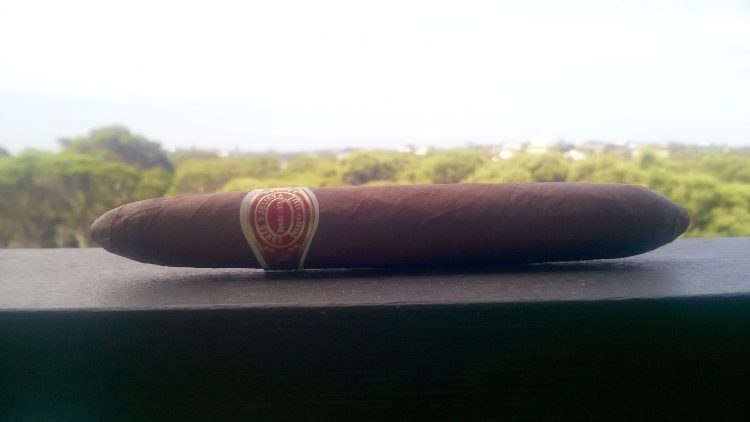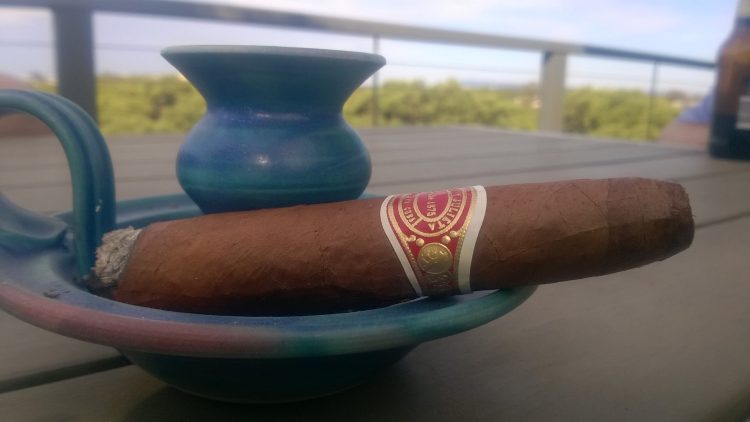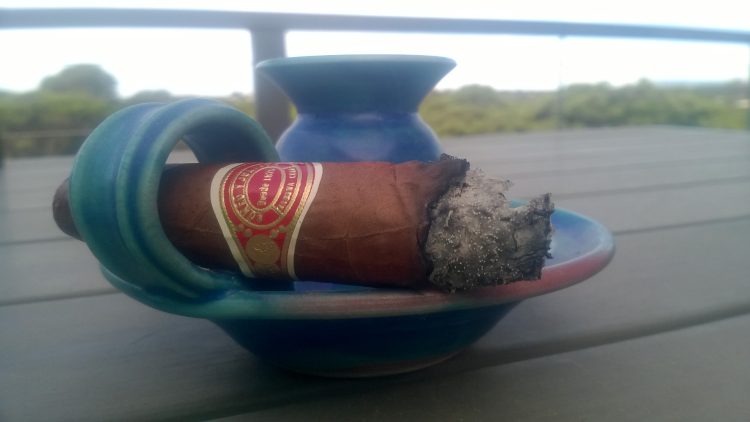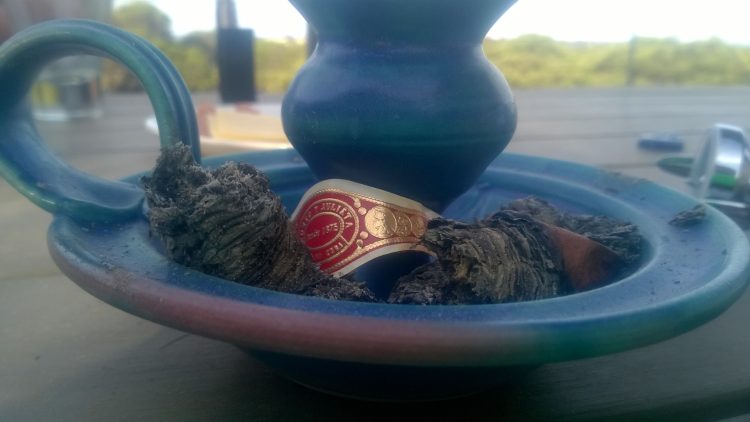Regular readers will know that I have had a bit of a mixed experience with the Replica Ancient Humidor cigars. As a release I don’t really believe in them: more so than anything else Habanos comes out with they are pure collector’s pieces, and in my book, cigars are for smoking, not collecting. The Romeo y Julieta version is more interesting than most, only because the cigars within are an old discontinued production size, that also crops up occasionally in other special releases. It will give me a few interesting points of comparison. Named the Romeos, they are a great fat perfecto, the classic cigar of the 1920’s cartoon millionaire. Mine is a pleasant looking thing, with a rich red wrapper. I’m pleased to observe that it continues the long tradition of crappy printing on the bands of ultra-premium cigars.
Set alight, it begins very mild, with a light, almost buttery spice. The beauty of a perfecto is that you can have the draw any way you like it, and mine is perfect. After about a centimetre, the smoke thickens and sweetens, rich honey with a herbal note – the tang component of oregano.
I’m smoking this cigar on the deck down at the Groom Compound, and I’m joined by two companions. One is Stevespool, an old school friend who has featured several times before in these pages, and the other is Troung, who has wound up on the deck because he’s dating one of Stevespool’s wife’s girlfriends. It is the first time that either of us have met him, and it is with some surprise that we discover that we all attended the same high school at the same time. We run though names of friends and teachers, trying to establish where we all fitted in the school’s social hierarchy, when suddenly something clicks in Troung’s eyes. “Wait” he says to me. “Were you the People’s Champion?”
For the first two years of my high school education – years seven and eight – I attended an elite private school. It was an expensive education, but worth it in my parents’ eyes, because of the vast array of extra-curricular activities afforded the students – orchestras, plays, a closed circuit television station, a vast array of sporting teams and so on. My parents’ son, unfortunately, did not see the same value. In my first two years I begrudgingly sang in the chorus of a few musicals, and mimed my way through the duties of third cello in the string orchestra, but beyond that, I did as little as possible. For me, playing video games with my friends took much higher priority than anything school could offer me.
So it was that at the end of year eight they offered me a choice: participate more in the expensive private school, or leave and attend a cheap government school, where I could waste as much time as I liked. I chose to leave.
The school I wound up at was Melbourne High, which is unique among high schools in my part of the world in that rather than take students from the local area, the sole criteria for admission was an entrance exam. Because of this, in a city where about 7% of the population comes from an Asian background, more than half of the student body at Melbourne High was Asian. How much the races interacted depended a bit on what classes you took – if you were a white guy who did physics, accounting and specialist maths, then you probably wound up friends with a few of the Asian guys. If you were a white guy like me who took theatre, media studies and literature then you more or less attended a school that was 100% white. This is why, despite having spent four years together in the close confines of a high school, Stevespool and I had never heard of Troung.
It was an interesting change for me, arriving at such an academic high school. At my previous schools I’d always been two things – the smartest guy in the room, and the biggest nerd. Not any more. At Melbourne High I was suddenly kind of a jock. I still remember orientation day – I was chatting with Raffaele, a guy I had met a few times before at a friend’s birthday parties, when he suddenly got up and walked over to some little Asian dweeb with glasses who was eating a bucket of hot chips. Raff took a chip out of the kid’s bucket without asking, ate it, and sneered “thanks for the chip.” The dweeb looked on silently, filled with impotent rage. I looked on in awe. “Holly shit,” I thought. “At any other school that would have been me getting picked on. In this place I’m one of the bullies.”
Troung was one of the bad boys of the school, the Asian gangsters. They hung out down behind the library, smoking only semi-covertly. I guess they must have still been doing their physics homework, because the school had a pretty rigorous expulsion policy for guys who didn’t make the academic standard, but at the time it seemed like they were just about hair gel, smoking, and (allegedly) dealing drugs. The only evidence I ever saw of it was that I once caught Allan Cho surreptitiously slipping a pill bottle full of brown liquid into his bag and he told me to “keep my fucking mouth shut.” At the time I assumed it was heroin, but in retrospect one doesn’t usually carry 200ml of heroin in solution, so I guess maybe it was decanted whisky, or perhaps a nice dark rum.
At the mid-point the cigar remains mild, light tobacco with nutty undertones. It is really quiet excellent, a delicate, elegant smoke, that is perfect for relaxed afternoons in the sun like the one that I am having. My first beer is still in front of me, while my compatriots are both well advanced in their second. Beer would only tarnish the delicate flavours of the Romeo.
By year 11 I had settled into my clique of vaguely arty kids, and was generally labelled as a stoner. I had had maybe two puffs of a university cigarette at that point in my life, but I was going for a sort of bohemian vibe, so I was happy to play along. I had long, boofy hair and a laid back attitude. On casual clothes days I wore trench coats and a lot of army disposal gear. I carried a Chairman Mao pocket watch.
The Student Representative Council President was elected in the final weeks of year 11, after the year 12s are off doing their exams. For reasons I don’t fully recall, I decided to run. It might have been a dare. The first step was to get approved by the faculty, which involved a letter to the Vice Principal, Mr. Woodful. I may have been a mediocre student, but I knew how to write an obsequious letter, and my application was long and heartfelt, speaking of the three generations of my family that had attended the school before me, and telling the story of my mum’s cousin, who had dropped dead during the fun run in the 1960s. I was delighted when I got called to the office: my candidacy had been accepted.
I got my first look at my opposition when I attended a briefing with Mr. Woodful, and he tried to instilled in us the seriousness of what we were doing. He told us that the SRC budget was $150,000, and that our peers would be devastated if we squandered it. There is a long tradition of embezzlement in the SRC, and he wanted us to know that it wouldn’t be tolerated in our year. Looking around at my fellow candidates, I started to wonder if maybe I had a shot at winning. There were five of them, and they looked like every other SRC candidate that I could recall, which is to say they were the dorkiest bunch of Asian dweebs imaginable. One candidate was clearly the establishment choice: Willard Hong, an A+ accounting student who had been heavily involved in SRC for years, and was the incumbent Vice President.
The week of campaigning launched on a Monday, with a special assembly for the speeches. The first to speak would be Willard, and then Brandon Chow (maybe not the least popular boy in the year level, but in the bottom five), and then me. The hall was packed that day: three year levels, nearly 1000 boys and teachers. Every seat was taken, and the overflow was sitting in the aisles. I hadn’t been on a stage since I stood on the back row of the chorus in Oliver, and I had never spoken in front of more than about thirty. I don’t think my heart has ever beat faster than when I was waiting my turn to speak.
Willard spoke softly and confidently, recounting his record as a faithful administrator. His sole election promise was to put a suggestion box in the cafeteria. Brandon read flatly from his prewritten speech, and lost the crowd completely about five sentences in, and soon couldn’t be heard above the cacophony of boys chatting. Mr. Woodful had to cut him off while he yelled at the school to pay attention. Brandon wrapped his speech early and slunk back in disgrace. It was my turn, and as I walked to the mic my leg was shaking so hard that I was worried that I wouldn’t be able to stand on it. I leaned heavily on the podium, took my speech out of my blazer pocket and dramatically tore it up (it was all theatre – had someone collected the scraps of paper they would have found the first line – “tear up speech”). About three sentences in I got my first laugh, and from there it was plain sailing.
The crux of my argument was that every SRC was always the same: no matter what we got eight sausage sizzles, three casual dances, and one formal. At the end of the year the year 12s got a t-shirt. There wasn’t enough responsibly in the position that anyone could really fuck it up, so you might as well elect someone with a bit of style. It wasn’t much of a case, but it didn’t matter because I made jokes, and more than that, I got the crowd a bit pumped up. “We will have a sausage sizzle!” I yelled, waving a finger in the air. “We will have some dances! And, yes” I said, turning smugly to Willard, “I’ll even give you a suggestion box!”
By the end of my speech the crowd was on their feet, stamping and cheering. The next three speakers were booed off the stage. I was ecstatic. I was going to win.
The rest of the week was campaign time. Officially we were allowed seven A4 sized posters on sanctioned notice boards around the school, and each one had to be stamped by the coordinator. I came up with seven different designs, had those stamped, and then photocopied them, blanketing the school. My slogan was “the same, but different.” Inspired by Mussolini, almost all of the posters featured my face on them somewhere. Willard Hong’s posters (he stuck to the regulated seven), featured the word “WHO?” in big bold letters, and in tiny font underneath, not visible from more than two meters away, “Willard Hong One.” Next to each one I hung an A3 blow-up of my face, answering his question. It was glorious.
I spent all my lunchtimes that week walking around, shaking hands and kissing babies. For four days I was king of the school. Wherever I went crowds formed around me while I fielded questions and signed year books. The vote was cast during first period on Friday, and at recess I wandered up to the Vice Principal’s office to scrutineer, as we had been told in the briefing that we could. Mr. Woodful intercepted me at the door. “Sorry Alex,” he said. “You can’t come in right now. Come back later.” Over his shoulder I could see that the count was in progress.
I came back later, but the office was empty. By mid-afternoon the rumours were flying. Willard had won, with Brandon second. Boys were coming up to me, some offering commiserations, the others taunts. “Bullshit” I told them all. “Maybe Hong won, maybe I didn’t anticipate the Asian vote or something, but there’s no way I came in after Brandon Chow.”
On Monday morning the results in the school bulletin made it official: Hong for President, Chow his vice. Almost in tears, I went to see Mr. Woodful, demanding to see the votes. He told me they had been destroyed. “There’s just no way, Mr. Woodful,” I said. “I just don’t see how I could have lost.” He closed the door conspiratorially. “There’s something you need to understand about democracy, Alex” he told me. “Sometimes the right candidate isn’t the one people vote for.” I looked at him, puzzled. “Are you saying you guys rigged the vote?” He opened the door, showing me out, smiled obliquely, and turned his palms skyward. The universal gesture of ‘who knows?’
Filled with impotent rage, I declared myself The People’s Champion, and for the next year I wrote an anti-establishment column of the same name in the school paper. It got a few good laughs, but nothing more. The was one epilogue though that gave me some satisfaction: at the end of the year I happened to be in the school, having just finished my literature exam, and I walked past the packed auditorium where the SRC President speeches were in progress. I stuck my head in. At the lectern a boofy haired white guy gesticulated wildly. On the chairs behind him slouched five other white guys, each with boofier hair than the last.
Right to the end the Romeo remains mild, with not a hint of tar, an astonishing feat in a smoke of these dimensions. In the final inch the predominate note is toasted caramel and butterscotch, with just a little vegetal chardonnay on the back of the throat. A really quite excellent cigar, that will number amongst the very best Romeo y Julieta has to offer. Much better than a Petit Coronas.
Romeo y Julieta Romeos Réplica de Humidor Antiguo 2008 on the Cuban Cigar Website



